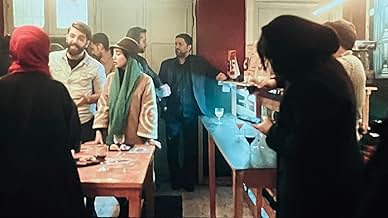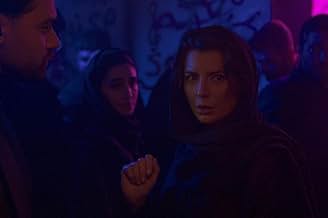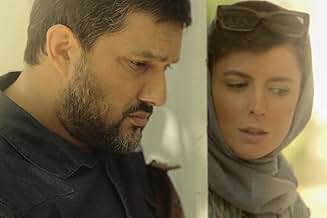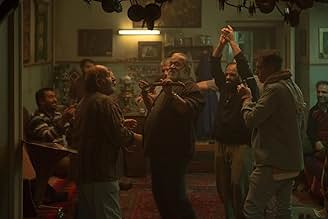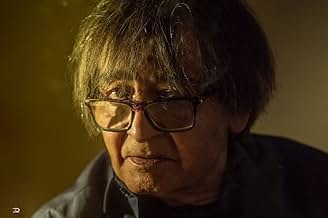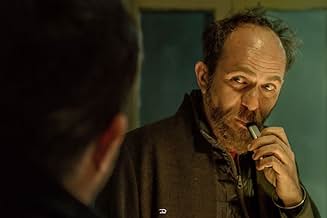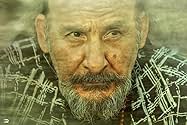Pir Pesar
- 2024
- 3h 12min
CALIFICACIÓN DE IMDb
7.9/10
1.7 k
TU CALIFICACIÓN
Dos hermanos iraníes viven con su padre abusivo. Cuando él alquila a una joven con intención de casarse con ella, la atracción de ella por el hijo mayor crea tensión en su ya fracturada fami... Leer todoDos hermanos iraníes viven con su padre abusivo. Cuando él alquila a una joven con intención de casarse con ella, la atracción de ella por el hijo mayor crea tensión en su ya fracturada familia.Dos hermanos iraníes viven con su padre abusivo. Cuando él alquila a una joven con intención de casarse con ella, la atracción de ella por el hijo mayor crea tensión en su ya fracturada familia.
- Premios
- 3 premios ganados y 1 nominación en total
- Dirección
- Guionista
- Todo el elenco y el equipo
- Producción, taquilla y más en IMDbPro
Opiniones destacadas
I've never seen an Iranian movie like The old Bracher in my whole cinematic life. Even I watched Maybe all of Iranian movies but there is nothing like this. That was spectacular. Absolute Cinema. I recommend it to the world as an amazing experiment. You won't blink while watching. It has unforgeable scenario, mind blowing actors such as Mr Poorshirazi.the music has feeling. It's related to the contain scene the movie doesn't have any additional or annoying scene.althiu It has only three location and the most of the movie is just in one. I haven't seen anything except Cinema, interest and goods. Watch it in Cinema.
The Old Bachelor," directed by Oktay Barahani, was for me more than just a typical drama. With Hassan Pourshirazi's outstanding performance as Gholam Bastani, the film skillfully portrays the archetype of the "Puer Aeternus" or "Eternal Youth." This character, despite his age, remains emotionally stunted, refusing to embrace the responsibilities of adulthood.
This interpretation is reinforced by Gholam's own pivotal dialogue: "A man whose life has no rules or order, even if he grows old, will remain an old boy and never truly grow up!" Furthermore, one can observe echoes of "Dionysus," the god of ecstasy and liberation, within Gholam Bastani, which perfectly complements the "Eternal Youth" aspect of his character. This is a profound and thought-provoking film that delves into the psychological layers of humanity.
This interpretation is reinforced by Gholam's own pivotal dialogue: "A man whose life has no rules or order, even if he grows old, will remain an old boy and never truly grow up!" Furthermore, one can observe echoes of "Dionysus," the god of ecstasy and liberation, within Gholam Bastani, which perfectly complements the "Eternal Youth" aspect of his character. This is a profound and thought-provoking film that delves into the psychological layers of humanity.
Well, where do I even begin? I just left the theater a few hours ago, and I'm still in shock. The movie starts off intriguingly, skillfully introducing each character. You immediately get a strong sense of everyone's personality and background, which makes it easy to connect with them on a deeper level.
The direction was stunning, and the cinematography was breathtaking. But what truly stood out was the acting. The entire cast-Qolam (Hassan Pourshirazi), Ali (Hamed Behdad), Reza (Mohammad Valizadegan), and Raana (Leila Hatami)-delivered performances that were nothing short of exceptional. Hassan Pourshirazi's portrayal of Qolam was particularly profound; it felt like the character and actor were one and the same. His performance ranks among the most realistic and deeply moving in recent Iranian cinema.
I've noticed some negative reviews, which I believe stem from the film challenging deeply rooted taboos in Iranian society. This film bravely confronts a taboo rarely addressed in Iranian cinema: the unquestioned respect for parents, especially fathers, regardless of their behavior. I'm not saying fathers shouldn't be respected, but only if they truly fulfill the role of a father-that is, someone a child can rely on and trust.
In many countries, organizations exist to support children with abusive parents or women facing abuse from older men-another taboo topic this film highlights. But in Iran, a father can legally inflict severe harm on his children, sometimes even lethal, with minimal consequences. This film powerfully depicts how a father's destructive behavior can ruin his children's lives, leaving them powerless to stand up against him.
Some critics argue that if this movie were made in Hollywood, it wouldn't have the same impact. But films must be judged within the cultural and social context in which they were made. It's telling that the film was completed four years ago but only released recently-no doubt due to government censorship cutting many scenes. Iranian filmmakers don't enjoy the creative freedom their Western counterparts do.
Taking all this into account, this film is a masterpiece that held me captive from start to finish. The last 30 minutes had me on the edge of my seat, and when the credits rolled, I was so overwhelmed I couldn't move for several minutes. This is a must-watch film that sheds light on how children can become victims of their parents, how young women can suffer at the hands of older men, and how society itself can fail its youth.
A truly brilliant film with outstanding performances.
The direction was stunning, and the cinematography was breathtaking. But what truly stood out was the acting. The entire cast-Qolam (Hassan Pourshirazi), Ali (Hamed Behdad), Reza (Mohammad Valizadegan), and Raana (Leila Hatami)-delivered performances that were nothing short of exceptional. Hassan Pourshirazi's portrayal of Qolam was particularly profound; it felt like the character and actor were one and the same. His performance ranks among the most realistic and deeply moving in recent Iranian cinema.
I've noticed some negative reviews, which I believe stem from the film challenging deeply rooted taboos in Iranian society. This film bravely confronts a taboo rarely addressed in Iranian cinema: the unquestioned respect for parents, especially fathers, regardless of their behavior. I'm not saying fathers shouldn't be respected, but only if they truly fulfill the role of a father-that is, someone a child can rely on and trust.
In many countries, organizations exist to support children with abusive parents or women facing abuse from older men-another taboo topic this film highlights. But in Iran, a father can legally inflict severe harm on his children, sometimes even lethal, with minimal consequences. This film powerfully depicts how a father's destructive behavior can ruin his children's lives, leaving them powerless to stand up against him.
Some critics argue that if this movie were made in Hollywood, it wouldn't have the same impact. But films must be judged within the cultural and social context in which they were made. It's telling that the film was completed four years ago but only released recently-no doubt due to government censorship cutting many scenes. Iranian filmmakers don't enjoy the creative freedom their Western counterparts do.
Taking all this into account, this film is a masterpiece that held me captive from start to finish. The last 30 minutes had me on the edge of my seat, and when the credits rolled, I was so overwhelmed I couldn't move for several minutes. This is a must-watch film that sheds light on how children can become victims of their parents, how young women can suffer at the hands of older men, and how society itself can fail its youth.
A truly brilliant film with outstanding performances.
The movie "The Old Bachelor" can be an interesting experience for any viewer in Iranian cinema. From the very first scenes of the film, the viewer realizes the difference between this film and other Iranian films. The special framing and color attract more attention. The introduction and foundation of Gholam's character is done well and we as viewers get to know him well. The character of Rana, who plays a central role in the second half of the film, also has a good foundation, but this introduction and completion of the character introduction could have helped the film to be better if it had been formed earlier. But the worst characterization and perhaps acting of this film was Ali, the son of Gholam, played by Hamed Behdad. Ali's character is a ready-made character type. You can see characters like this outside the film in many series and films, but in this film you should not see exactly or even worse than other cases. Ali, regardless of his personality, is the son of Gholam. Being the son of Gholam should make Ali different. Hamed Behdad's acting was also insensitive. But this does not mean that this character does not do his job well in the film. The film uses the character it created and does not falter. The cinematography is one of the strengths of the work, which imprints lasting scenes in the viewer's mind. Although the script is very well-written and logical, there are several minor flaws that prevent it from being completed. For example, where does the father get so much money? Ali and Reza's exit at the end of the film and creating a situation for Gholam was completely to advance the story and there was no strong logic behind it. And the most important point is that more work should have been done on completing the characters (especially Ali's character).
The ending is also shocking and perhaps impressive at first, but in the end it was rushed and ineffective. After an hour, the ending is not at all the part of the film that you want to talk about. It even lacked logic in some ways! The final conflict, which could have been the peak of the story and narrative, became the only point to end the film and only ended the story. Although despite all this, the mise-en-scène of the last minutes of the film was unique in Iranian cinema.
In the end, we saw a film that was several levels better than other Iranian films in recent years, and all the negative points I mentioned above do not prevent you from enjoying this film and making it one of the best Iranian films you have ever seen. In my opinion, if the above points were corrected, they would have made this film more memorable.
The ending is also shocking and perhaps impressive at first, but in the end it was rushed and ineffective. After an hour, the ending is not at all the part of the film that you want to talk about. It even lacked logic in some ways! The final conflict, which could have been the peak of the story and narrative, became the only point to end the film and only ended the story. Although despite all this, the mise-en-scène of the last minutes of the film was unique in Iranian cinema.
In the end, we saw a film that was several levels better than other Iranian films in recent years, and all the negative points I mentioned above do not prevent you from enjoying this film and making it one of the best Iranian films you have ever seen. In my opinion, if the above points were corrected, they would have made this film more memorable.
The film was shocking and at the same time fascinating, a 3-hour film that no one left the theater during the screening! The story progressed well for the first hour, and when it reached the second hour, it became a little boring. I think this film could have been much more interesting at 2 and a half hours. The last 30 minutes of the film are when the story reaches its darkest point, and several horrible secrets are revealed and those shocking events occur that are like a bucket of ice water being poured on the viewer. Despite being still in shock, the viewer looks at the last frame, which is full of longing, tragedy, and blood, and that music and the dirty, messy house, which now has negative energy lurking in every corner, and the film ends.
Selecciones populares
Inicia sesión para calificar y agrega a la lista de videos para obtener recomendaciones personalizadas
Detalles
- Fecha de lanzamiento
- País de origen
- Idioma
- También se conoce como
- The Old Bachelor
- Ver más créditos de la compañía en IMDbPro
- Tiempo de ejecución
- 3h 12min(192 min)
- Color
Contribuir a esta página
Sugiere una edición o agrega el contenido que falta

